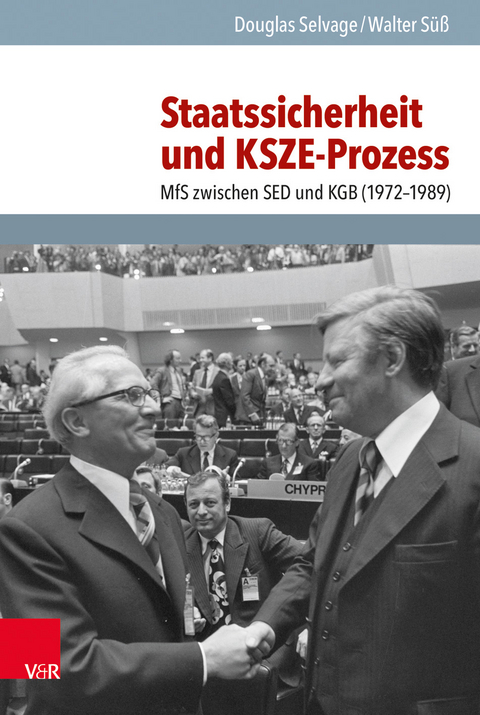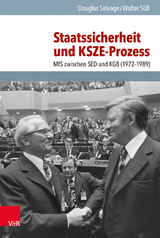Staatssicherheit und KSZE-Prozess
MfS zwischen SED und KGB (1972–1989)
Seiten
2019
Vandenhoeck & Ruprecht (Verlag)
978-3-525-31069-4 (ISBN)
Vandenhoeck & Ruprecht (Verlag)
978-3-525-31069-4 (ISBN)
Das Buch analysiert die Rolle und Wirkung des Ministeriums für Staatssicherheit (MfS) im KSZE-Prozess.
The book analyzes the role, activities and influence of the East German Ministry of State Security (MfS or Stasi) not only in connection with the Conference for Security and Cooperation in Europe (CSCE) and its follow-up conferences (i. e., the "CSCE Process"), but also in terms of limiting its influence upon East German society in terms of improved human rights and increased human contacts between East and West. On the one hand, the MfS supported the hard line of the East German party and state leadership in the CSCE process - also, when necessary, in opposition to the Soviet Union. On the other hand, the MfS supported Moscow's demands - also communicated by its "fraternal organ", the KGB - that the East German leadership should conduct a policy of strict "delimitation" (Abgrenzung) with regard to West Germany in order to seal Germany's division. In general, Minister of State Security Erich Mielke supported the hardest possible line toward West Germany, whether as a representative of the East German Party leadership with regard to Moscow or as a supporter of Moscow's hard line for the GDR towards West Germany within the SED regime. However, the economic weakness of the GDR and the Soviet Union, further exacerbated by the arms race with NATO and especially the U.S. in the 1980's, led to concessions by both regimes to the West both within and outside of the CSCE process that further limited the possibilities of the MfS in terms of repressing East German dissidents. More importantly, this was also the case with regard to the growing movement to emigrate from the GDR to West Germany that had developed in response to the GDR's signing of the CSCE Final Act in Helsinki in August 1975. In the end, the Stasi, which had always been a "servant of two masters" - i. e. the East German Party and the Soviet Union, represented by the KGB - could no longer keep the domestic effects arising from the CSCE process and détente under control because of the concessions of its two erstwhile "masters" to the West.
The book analyzes the role, activities and influence of the East German Ministry of State Security (MfS or Stasi) not only in connection with the Conference for Security and Cooperation in Europe (CSCE) and its follow-up conferences (i. e., the "CSCE Process"), but also in terms of limiting its influence upon East German society in terms of improved human rights and increased human contacts between East and West. On the one hand, the MfS supported the hard line of the East German party and state leadership in the CSCE process - also, when necessary, in opposition to the Soviet Union. On the other hand, the MfS supported Moscow's demands - also communicated by its "fraternal organ", the KGB - that the East German leadership should conduct a policy of strict "delimitation" (Abgrenzung) with regard to West Germany in order to seal Germany's division. In general, Minister of State Security Erich Mielke supported the hardest possible line toward West Germany, whether as a representative of the East German Party leadership with regard to Moscow or as a supporter of Moscow's hard line for the GDR towards West Germany within the SED regime. However, the economic weakness of the GDR and the Soviet Union, further exacerbated by the arms race with NATO and especially the U.S. in the 1980's, led to concessions by both regimes to the West both within and outside of the CSCE process that further limited the possibilities of the MfS in terms of repressing East German dissidents. More importantly, this was also the case with regard to the growing movement to emigrate from the GDR to West Germany that had developed in response to the GDR's signing of the CSCE Final Act in Helsinki in August 1975. In the end, the Stasi, which had always been a "servant of two masters" - i. e. the East German Party and the Soviet Union, represented by the KGB - could no longer keep the domestic effects arising from the CSCE process and détente under control because of the concessions of its two erstwhile "masters" to the West.
Dr. Douglas Selvage ist derzeit wissenschaftlicher Mitarbeiter am Institut für Geschichtswissenschaften der Humboldt-Universität zu Berlin und ehemaliger Projektleiter in der Forschungsabteilung des Stasi-Unterlagen-Archivs.
Dr. Walter Süß ist emeritierter Forschungsprojektleiter in der Abteilung Bildung und Forschung des BStU.
Horst Möller war 1992-2011 Direktor des Instituts für Zeitgeschichte München–Berlin sowie 1996-2011 Ordinarius für Neuere und Neueste Geschichte an der Universität München.
Manfred Wilke, geboren 1941 in Kassel, Dr. rer. pol.
Dr. Florian Steger ist Universitätsprofessor und Direktor des Instituts für Geschichte, Theorie und Ethik der Medizin der Universität Ulm.
| Erscheinungsdatum | 11.02.2019 |
|---|---|
| Reihe/Serie | Analysen und Dokumente der BStU ; Band 054 |
| Mitarbeit |
Berater: Nancy Aris, Katrin Budde, Thomas Hacker, Petra Morawe, Iris Gleicke, Martin Gutzeit, Horst Möller, Astrid Rothe-Beinlich, Siegmund Ehrmann, Manfred Wilke, Jörn Wunderlich, Uwe Schwabe, Florian Steger, Jörn Mothes, Bodo Walther, Kai Langer |
| Verlagsort | Göttingen |
| Sprache | deutsch |
| Maße | 160 x 237 mm |
| Gewicht | 1268 g |
| Themenwelt | Geschichte ► Allgemeine Geschichte ► Zeitgeschichte |
| Geisteswissenschaften ► Geschichte ► Regional- / Ländergeschichte | |
| Schlagworte | Deutschland (DDR) /Geschichte, Politik 1945 ff. • Kalter Krieg • Ministerium für Staatssicherheit (DDR) |
| ISBN-10 | 3-525-31069-2 / 3525310692 |
| ISBN-13 | 978-3-525-31069-4 / 9783525310694 |
| Zustand | Neuware |
| Haben Sie eine Frage zum Produkt? |
Mehr entdecken
aus dem Bereich
aus dem Bereich
Buch | Hardcover (2012)
Westermann Schulbuchverlag
CHF 44,90
Schulbuch Klassen 7/8 (G9)
Buch | Hardcover (2015)
Klett (Verlag)
CHF 29,90
Buch | Softcover (2004)
Cornelsen Verlag
CHF 23,90




